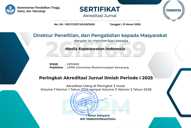Increased Depression Affects Hyperglycemia Status in Type II Diabetes Mellitus Patients
(1) Program Studi S1 Keperawatan, STIKes Widya Husada Semarang
(2) Program Studi S1 Keperawatan, STIKes Widya Husada Semarang
(3) Program Studi S1 Keperawatan, STIKes Widya Husada Semarang
(*) Corresponding Author
Abstract
Diabetes mellitus is a collection of symptoms that arise in a person caused by an increase in blood glucose levels. Chronic diseases such as type II diabetes mellitus can affect their psychological condition, namely depression. From the preliminary results the researchers compared 5 patients with type II diabetes mellitus in the Mijen health center area, 1 of them experienced fatigue, 4 of them experienced insomnia, were not productive, tired quickly when activity and appetite decreased. The purpose of the study was to determine the relationship between the level of depression with blood sugar levels in patients with type II diabetes mellitus. This type of research uses quantitative non-experiment with cross sectional design. Sampling with purposive sampling technique. Data were collected through questionnaires, analyzed using Sperman rank statistical test with a significant limit of 0.05. In this research shows pearson correlation coefficient rate of 0,524 and ρ =0,000. It show the significant positive correlation between depression and blood glucose level on diabetic type II patient with the medium corelation level. The results showed that there was a relation between depression with blood glucose level in diabetes mellitus type II patients.
Keywords
Full Text:
PDFReferences
Cho, N. H. (2017). IDF Diabetes Atlas Eighth edition 2017. International Diabetes Federation.
Derek, M. I. (2017). Hubungan Tingkat Stres Dengan Kadar Gula Darah Pada Pasien Diabetes Melitus Tipe Ii Di Rumah Sakit Pancaran Kasih Gmim. Manado: FKU Sam Ratulangi.
Dinas Kesehatan Provinsi Jawa Tengah. (2018). Profil Kesehatan Provinsi Jawa Tengah Tahun 2017. Semarang: Dinas Kesehatan Provinsi Jawa Tengah.
Hasanat, N. U. (2010). Program Psikoedukasi Bagi Pasien Diabetes Untuk Meningkatkan Kualitas Hidup. Yogyakarta: Universitas Gajah Mada.
Irawan, D. (2010). Prevalensi dan Faktor Risiko Kejadian Diabetes Melitus Tipe 2 di Daerah Urban Indonesia (Analisa Data Skunder Riskesdas 2007). Jakarta: Universitas Indonesia.
Juddin, D. R. (2017). Hubungan tingkat pengetahuan faktor resiko DM dengan status DM pada pegawai negeri sipil alauddin makasar. http://www.jurnal.ummu.ac.id/index.php/BIOSAINSTEK/article/download/211/131/. Makasar: FKK Uin Alauddin Makasar.
Kurniati, E. (2017). Hubungan Tingkat Depresi Dengan Kualitas Tidur Pasien Diabetes Mellitus Tipe 2 Di Poli Penyakit Dalam RSUD Panembahan Senopati Bantul. Yogyakarta: STIKES Jenderal Achmad Yani Yogyakarta.
Masriadi. (2012). Epidemiologi Diabetes Melitus. Yogyakarta: Penerbit Ombak.
Mujabi, M. F. (2017). Hubungan Kadar Gula Darah Dengan Tingkat Depresi Dan Keaktifan Fisik Pada Penderita Diabetes Melitus Di Puskesmas Gatak Sukoharjo. Surakarta: FKU Muhamadiyah Surakarta.
Nindyasari, N. (2010). Perbedaan Tingkat Kecemasan Pada Penderita Diabetes Melitus (DM) Tipe I Dengan Diabetes Melitus (DM) Tipe I. Surakarta: Universitas Sebelas Surakarta.
PERKENI. (2015). Konsensus Pengelolaan dan Pencegahan Diabetes Melitus Tipe 2 di Indonesia 2015. Jakarta: PB. PERKENI.
Tsenkova, V. A. (2013). Trait Anxiety and glucose Metabolism in People Without Diabetes : Vulnerabilities Among Black Women. Diabet Med , 24(6); 803 – 806.
Tsenkova, V., Albert, M., Georgiades, A., Ryff, C. (2013). Trait Anxiety and glucose Metabolism in People Without Diabetes : Vulnerabilities Among Black Women. Diabet Med , 24 (6). 803-806.
Veghari, G. S. (2010). Association between socio-demographic factors and diabetes mellitus in the north of Iran: A population-based study. International Journal of Diabetes Mellitus , Volume 2, Issue 3, December 2010, Pages 154-157.
Zuberi, S. S. (2015). Association of adaepression aawith atareatment Outcomes in type 2 Diabetes Melitus : a cross- sectional study from Karachi, Pakistan. Pakistan: BMC Pschiatry.
Article Metrics
Abstract view : 2162 timesPDF - 89 times
DOI: https://doi.org/10.26714/mki.2.3.2019.121-127
Refbacks
- There are currently no refbacks.
Copyright (c) 2019 Dwi Nur Aini

This work is licensed under a Creative Commons Attribution 4.0 International License.
This journal is indexed by:
Kedungmundu Raya No. 18 Semarang NRC Building Universitas Muhammadiyah Semarang
Phone: 02476740287
Fax: 02476740287
Email: mki@unimus.ac.id





















